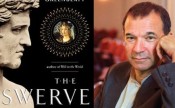Q&A: STEPHEN GREENBLATT, National Book Award Winner, THE SWERVE: How the World Became Modern
Written on January 21st, 2012 |
Aired 01/15/12
In the winter of 1417, a short, genial, cannily alert man in his late thirties plucked a very old manuscript off a library shelf, saw with excitement what he had discovered, and ordered that it be copied. The man was Poggio Braccionlini, the greatest book hunter of the Renaissance. His discovery was the last surviving manuscript of an ancient Roman philosophical epic, On the Nature of Things by Lucretius—a beautiful poem of the most dangerous ideas: that the universe functioned without the aid of gods, that religious fear was damaging to human life, and that matter was made up of very small particles in eternal motion, colliding and swerving in new directions.
The copying and translation of this ancient book fueled the Renaissance, inspiring artists such as Botticelli and thinkers such as Giordano Bruno; shaped the thought of Galileo and Freud, Darwin and Einstein; and had a revolutionary influence on writers such as Montaigne and Shakespeare and even Thomas Jefferson.
Stephen Greenblatt is John Cogan University Professor of the Humanities at Harvard University. Among his books are Will of the World: How Shakespeare Became Shakespeare, a Finalist for the 2004 National Book Award in Nonfiction and a New York Times best seller, and Hamlet in Purgatory. He holds honorary degrees from Queen Mary College of the University of London and the University of Bucharest.
